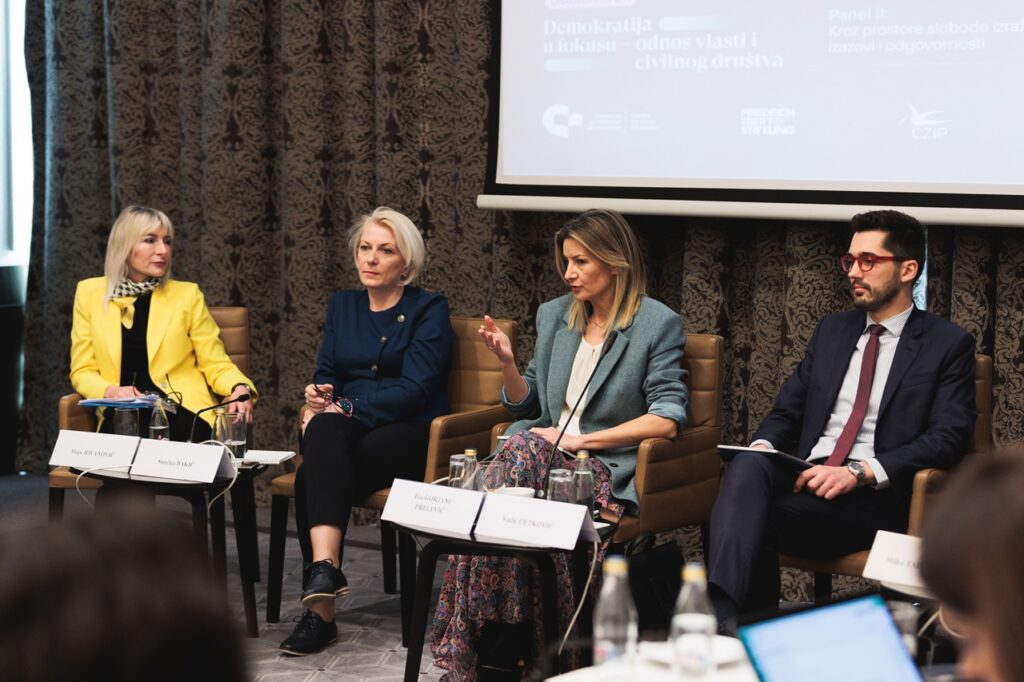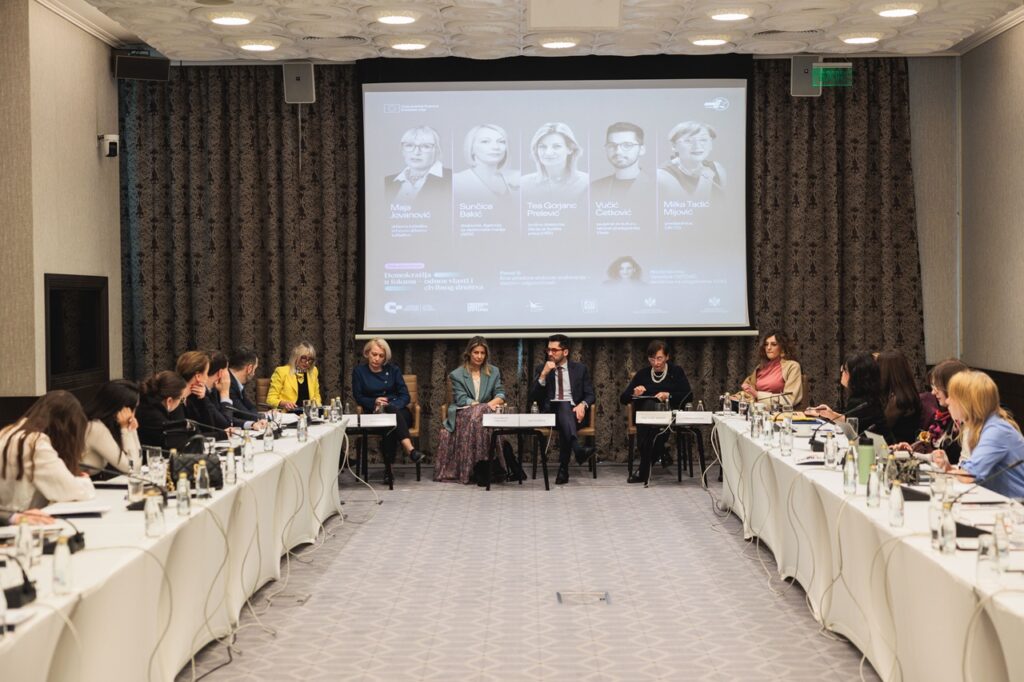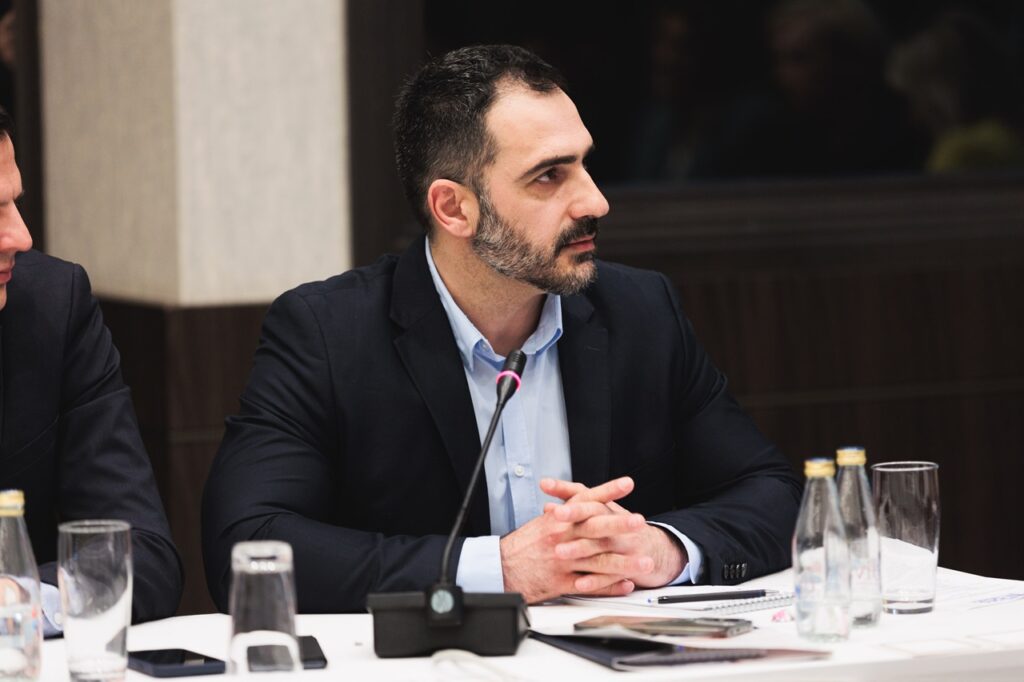Defining a clear boundary between freedom of expression and situations where its limitation is necessary represents a particular challenge for today’s society, where hate speech is becoming increasingly prevalent. This was assessed at the second panel of the discussion forum “Democracy in Focus – the Relationship between Government and Civil Society“, organized by the Centre for Civic Education (CCE).
The State Prosecutor at the State Supreme Prosecutor’s Office (SSPO), Maja Jovanović, stated that freedom of expression does not only encompass information that is favorably received and viewed with indifference. “Freedom of expression also includes information that shocks or disturbs because, as international standards indicate, it tests tolerance and open-mindedness, without which there is no democratic society,” emphasized Jovanović at the panel “Navigating Spaces of Freedom of Expression – Challenges and Responsibilities.”
She assessed that it is crucial to emphasize that freedom of expression is not absolute and has limitations, applicable in situations related to national security interests, preventing disorder or crime, protecting health, reputation, or rights of others, an ensuring the preservation and impartiality of the judiciary. “Defining a clear boundary between freedom of expression and situations where its limitation is necessary represents a particular challenge for today’s society, where hate speech is increasingly present,” Jovanović stated.
She reminded that hate speech is defined not only as speech leading to acts of violence, intimidation, hostility, or discrimination but also as speech that can reasonably be expected to have such an effect. She also pointed out the need for clearer definitions in Montenegrin laws regarding the hate speech.
Jovanović noted that certain decisions of the prosecution in specific cases have been criticized by the public. “But that does not mean that we in the State Prosecution Office run away from criticism, but rather that we believe that state prosecutors should justify their decisions, whatever they may be, before the court, and it is the court that makes the final decision,” she explained.
According to her, the expansion of social media has led to various forms of technology abuse. “We witness the increasingly present cyber harassment, endangerment, or attacks on the rights of others, and therefore, I return to the necessity of establishing a balance between freedom of expression, on one hand, and the protection of privacy and public interest, or other values of democratic society, on the other hand, in order to ensure the rule of law,” underlined Jovanović.
Responding to the question of what mechanisms the SSPO can implement to clearly distinguish between freedom of expression and hate speech, Jovanović replied that it is education and specialization of prosecutors, aiming to apply international standards and better understand the complexity of the issue.
Answering whether the prosecution will continue to insist on proceedings against historian Boban Batrićević, Jovanović stated that the prosecutor dismissed the criminal complaint but proposed the initiation of misdemeanor proceedings, which the court accepted, and the trial is ongoing.
“I personally cannot express my views on the ongoing case because it would be a violation of ethical norms, but I can say that the Supreme State Prosecutor is currently analyzing this specific case,“ Jovanović said.
Tea Gorjanc Prelević, Executive Director of the Human Rights Action, speaking about the appeal of 22 non-governmental organizations to the prosecution to suspend misdemeanor proceedings against Batrićević, stated that they do not understand why proceedings are being conducted against him and that the request for initiating such proceedings is unsubstantiated, but she also appreciates that it is a problem that the prosecution must address.
“I think we could rightly be scared and intimidated and perceive such a request for initiating misdemeanor proceedings as a targeted intimidation of the right to criticize in Montenegro,” emphasized Gorjanc Prelević.
She added that they believe an inappropriate demonstration of prosecutorial power has been made, inadequate to the rule of law systems.
“Criminal proceedings are already a form of societal repression; it is not pleasant to be involved in criminal proceedings. Moreover, not every intolerant statement deserves criminal proceedings. This is an extreme measure activated in extreme cases of hate speech that truly require such a repressive response. We must endure the level of provocation; we must get used to it, and we must develop those democratic muscles to establish that,” said Gorjanc Prelević.
She also underscored the necessity of professionalization and specialization of prosecutors dealing with these issues. “Hate speech and freedom of expression are complex topics, and the prosecution must have a sense of it because the powers it has require specialization and adequate understanding of international and European standards,” Gorjanc Prelević emphasized.
She believes that the key thing everyone should unite around is the introduction of civic education as a compulsory subject in schools.
The Director of the Agency for Electronic Media (AEM), Sunčica Bakić, stated that, amidst a sea of disinformation and heightened rhetoric, today we often talk about how to protect citizens from harmful or prohibited forms of speech. “There seems to be a public impression that we, as a society, are seeking to have less freedom than we do, which is nonsense,” Bakić added.
She pointed out that the amount of hate speech in traditional media and online space is not the same, but those two should not be separated. On the other hand, she believes that hate speech on radio and television is very rare, and it is not something to be concerned about. That is true, she said, but it is not the whole truth.
“At this moment, in Montenegrin traditional media, there is a huge amount of intolerant, offensive speech that is not prohibited and is protected by freedom of expression, but that does not mean that we should be happy or satisfied that such a large amount of such a narrative is present,” Bakić stressed.
She agreed that by relativizing and neglecting the existence of such discourse, the problem will not be solved. “It moves into the online space, and it is present there. In a way, we enter a vicious circle that does not end,” said Bakić, adding that even developed democracies face the same problem.
Bakić stated that a new set of media laws should create a better framework as it transposes a directive prescribing standards for audiovisual media services and strengthens the position of the AEM.
The Culture Advisor in the Prime Minister’s Cabinet, Vučić Ćetković, assessed that the issue of freedom of expression is crucial for every society and its democracy. As he said, art not only helps shape public opinion but also represents its expression and can lead to the public confronting significant everyday problems.
“Often, it is precisely artists and cultural workers who point out problems, express necessary truths, say what is unspoken, and make visible what is invisible, using artistic and cultural means and creating space for social discussion,” emphasized Ćetković.
According to him, the connection between art and freedom of expression is complex and very important. “Today, culture and art have an extremely important social role and are, in a broader context, indicators for civil liberties,” Ćetković said.
The President of the Center for Investigative Journalism (CIJ), Milka Tadić Mijović, said that it is the duty of the media and civil society to always defend freedom of expression, no matter how much they disagree with someone’s opinion.
“One of the crucial issues is the adoption of a new set of media laws. I hope that some things will be defined to improve freedom of expression and media freedom,” said Tadić Mijović. She added that it would be significant to pay attention to strengthening the role of the Public Service in the new legal set, which, she said, should be the main promoter of freedom of expression and the stage where different opinions will be heard. Tadić Mijović pointed out that it would be very good to regulate issues related to the transparency of media ownership and financing in the new legislative set.
“We live in extremely challenging times, in which it is difficult to restrain the effects brought by new technologies, social networks, the internet, at times when we have degradation concerning the processes of democracy,” Tadić Mijović believes.
She said that there will always be individuals and media that will spread hatred, but it is only a matter of how and by what mechanisms to limit and punish that.
At the end, concluding the discussion forum, the Programme Director of the CCE, Petar Đukanović, assessed that the framework for the functioning of civil society in Montenegro is not yet sufficiently stimulating. “We definitely still need to work on harmonizing the legislative framework, but also the practice,” said Đukanović. He mentioned that they have recognized a chronic lack or lack of trust between civil society organizations and the authorities, as well as a lack of substantive dialogue.
“An important issue that we touched upon during the forum is the issue of freedom of expression, and rights and freedoms in this area are crucial for the functioning of the civil sector,” Đukanović said.
According to him, as a key recommendation, it became apparent that further strengthening of capacities, primarily of institutions such as the prosecution, to understand the distinction between freedom of expression and hate speech, is necessary.
The aim of the discussion forum is to contribute to the strengthening of dialogue between institutions and civil society, exchange of opinions, and opening up space for constructive cooperation to improve the environment for the operation and development of the civil sector.
The discussion forum is one of the activities of the project “CSOs in Montenegro – from Basic Services to Policy Shaping – M’BASE”, implemented by the CCE in partnership with the German Friedrich Ebert Foundation, the Center for Bird Protection and Study of Montenegro, and the Politikon Network, in cooperation with the Ministries of Public Administration and for European Affairs. The project is implemented with the financial support of the European Union and co-financing from the Ministry of Public Administration.
MINA



